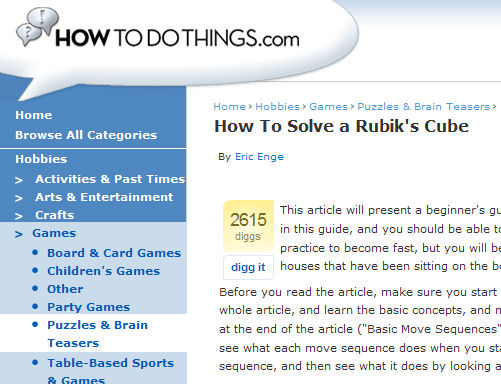The process for winning on Digg (and other social media sites) is a complex one. This has been made even more complex by recent changes in the Digg algorithm. Many webmasters strive to develop content that will score well on Digg, looking for tons of traffic and lots of links.
The first key, obviously, is to truly deliver value to the audience. Since we are not going to cover this aspect of social media here, check out our article on Secrets for Success on Digg for more details on that. Here we are going to focus on what you need to do to hit home runs.
It is well documented that Digg traffic tends to be of poor quality – they are not buyers. However getting a mass of links could be of great value, provided that they are relevant. This realization is the first step towards true Digg success. Getting a mass of links about Tupperware to a site about blue widgets may not hurt you, but you are not really leveraging the opportunity that is available.
The first big key then is relevance. Whatever business you are in, you want to generate articles directly related to that business. Of course, these articles need to be tailored to the specific preferences of the target audience. Assuming that you can meet these goals, your chances of true success will go up dramatically.
This is not by itself enough. For example, if you are submitting a photo of Carmen Electra, or an article about Hot Chicks With Douchebags, you are probably not building a lot of value into your site.
You need to try and create value that could be related to your business. Here is an example of a great submission of a cartoon about the costs of bottled water. While it’s quite simple and has no supporting information around it, this could have come from a site that offered related products.
What is cool about this post is that it very quickly and graphically makes a point about the costs of drinking bottled water. That, together with the fact that the Digg audience is very environmentally conscious, let to its success.
We ran our own experience, working together with How To Do Things, a client of ours. Our approach was a bit different, and the topic we chose was How to Solve a Rubik’s Cube. A search on Digg brings up 23 articles on the topic.
Basically, it was a topic covered many times before, with 3 prior articles garnering more than 2000 Diggs. So what could we offer that was new?
We focused on a couple of things to add new unique value:
- Developing a truly authoritative guide for solving the cube, and making it usable for the widest possible audience.
- Animating the process using a unique program developed by former world champion cuber Lars Petrus (who is also a Google employee). The animations are key because readers can truly take slow steps through the entire process.
Here is a picture depicting the results:
 |
As you can see, this article about an old and highly used topic on Digg netted more than 2600 Diggs, the second highest total of any Digg article on the topic all the time. Not too shabby. And the best thing is that it’s on a topic that fits the site in question.
The key thing to realize is that an authoritative article CAN be successful on Digg, and it can be relevant at the same time. Regardless of the medium you choose (social media, widgets, or whatever) the key to success is scoring on these 2 points: Relevance and Authority. Don’t leave home without it.
